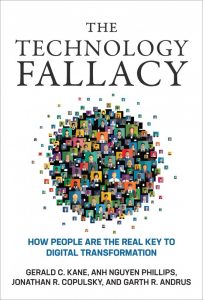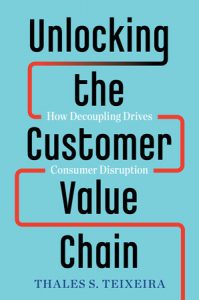
B2B Sales Culture Must Change to Make the Most of Digital Tools
For B2B firms to thrive in disruptive environments, there must be a synergy between online and offline channels.
ISBM at the Penn State Smeal College of Business – Academic Institute supporting B2B Research. Switch to the ISBM-Corporate website.

For B2B firms to thrive in disruptive environments, there must be a synergy between online and offline channels.

This book focuses on the organizational changes needed to harness the power of technology – with special attention to the people factor. Per the authors, the best way to respond to digital disruption is by changing the company culture to be more agile, risk tolerant, and experimental. Digital transformation involves leadership, talent development, culture, organization, and strategy.

Crises offer opportunity. In this opinion piece from Knowledge at Wharton by Jerry Wind, emeritus professor of marketing at Wharton, and Nitin Rakesh, CEO of Mphasis, an IT firm headquartered in Bangalore, India, ten guidelines are discussed that can help organizations to effectively create opportunities in times of crisis.

In this article, several insights that may inspire marketers in considering sustainability opportunities and challenges are covered. Examples are offered on how marketers innovate at hyperspeed and demonstrate agility in rethinking products and business models. Even though this article is written based on many B2C examples, changing consumer preferences will ultimately affect B2B processes as well.

It is widely believed that a B2B relationship disruption, which refers to the change of the salesperson in a customer relationship with another salesperson within the same firm, results in negative consequences such as a loss of customer knowledge, diminished interpersonal trust, and increased uncertainty. However, some B2B relationship disruptions also have positive effects that countervails some of the negative effects of disruptions. Results of this study indicate that relationship disruption can decrease resale value by 28.8% but it can also revitalize the relationship and increase new sales revenue by 52.2%.

“There are many crisis environments where “laying low” is a sound strategy. This is not one of them.” – Andrea Coville, CEO of Brodeur Partners as part of ISBM’s Marketing in Uncertain Times Town Hall Series. Andrea joined with B2B and B2C marketing expert Tom Kramer, founder and CEO of Essex Digital Platform, to show how businesses are still under-communicating to both customers and employees, why this high risk strategy needs to change, and how to leverage effective communications now and in the future.

ISBM’s Marketing in Uncertain Times series continues with our second Town Hall, another impactful installment on how marketing professionals can

In partnership with EMM Group, the corporate ISBM partner has put together the attached tutorial on how marketers should revisit their plans and rapidly assess the major shifts occurring in your marketplace. As marketers, you are well positioned to exert your value and help shape the near-term direction of your firm. The tutorial references several valuable tools assembled into a toolkit that can be sent to you upon your request. In order to receive the toolkit, respond as instructed in this tutorial.

Managers lack clear guidance on how to deal with a global disruption such as the current COVID-19 pandemic. This article reports on the results of an analysis of the effects of the Chinese government quarantines on companies and workers. The outcomes of this research offer important lessons for managers. In this study, among others, the authors cover the pandemic’s impact on China’s economy, global trade, production, and pollution. They also identify best practices, ranging from remote working, operational shocks, and the role of an organization in the wider community.

In his book ‘Unlocking the Customer Value Chain, Harvard Business School professor Thales Texeira describes how the disruption of an industry is driven by customer behavior rather than technologies. Innovative new business models allow startups to ‘decouple the value chain’ – picking one aspect of an incumbent’s business model and doing it better.
© 2024 ISBM – Institute for the Study of Business Markets

484 Business Building
University Park, PA 16802
Phone: 814-863-2782
Fax: 814-863-0413
Email: ISBM@psu.edu
© 2020 ISBM – Institute for the Study of Business Markets